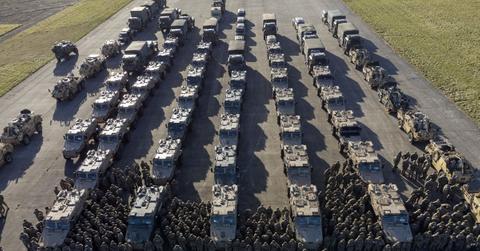On the Brink? Poland May Intercept Russian Missiles Amidst Rising Risk of Global Conflict

NATO troops did war exercises on Russia's doorstep this month.
The escalating tensions between NATO and Russia amid the ongoing Ukraine conflict have raised the specter of potential direct involvement by the alliance.
Recent developments suggest that Poland, a NATO member, is deliberating whether to intercept Russian missiles breaching its airspace.
Deputy Foreign Minister Andrzej Szejna of Poland indicated that NATO is exploring strategies, including intercepting such missiles close to the alliance's border, contingent upon Ukrainian consent and considering international ramifications.
This move would aim to intercept Russian missiles before they enter NATO territory, as reported by Anton Gerashchenko, an advisor on Ukrainian internal affairs.
The prospect of NATO engaging in such actions carries significant implications. Thus far, NATO has sought to avoid direct confrontations with Moscow regarding the Russia-Ukraine conflict.
However, Russian President Vladimir Putin's recent remarks hint at the world being on the brink of a global conflict, with any interception of Russian missiles potentially perceived as Western provocation.
These deliberations follow an incident in which a Russian missile entered Polish airspace before striking Ukrainian territory.
Poland has demanded explanations from Moscow, emphasizing the recurrent nature of such violations. The Polish Armed Forces Operational Command reported the intrusion, underscoring the gravity of the situation.
- War Games: Russia Issues Stark Warning After NATO's F-16 Jet Transfer Ratchets Up Tensions with NATO
- War Games? Russian Military Movement Suggests Russia 'Preparing for Possible Conflicts' with NATO, Neighboring Countries: Analysts
- Prepping for WWIII? NATO Nations Rush to Build Bunkers Along Russian Border
Moreover, concerns persist regarding Russia's military buildup and its implications for NATO.
While Russia plans to bolster its conventional military capabilities with the creation of new armies and divisions, analysts assert that these developments do not necessarily signal an imminent war with NATO.
Never miss a story — sign up for the Front Page Detectives newsletter. Be on the scene the moment news breaks.
Former British diplomat John Foreman interprets Russia's actions as defensive measures in response to perceived NATO expansion, rather than preparations for an offensive.
However, assessments by the Institute for the Study of War suggest that Russia's intentions regarding NATO are long-term. They highlight Russia's ongoing structural reforms aimed at enhancing its military capabilities for potential large-scale conflicts with NATO in the future.
Become a Front Page Detective
Sign up to receive breaking
Front Page Detectives
news and exclusive investigations.
